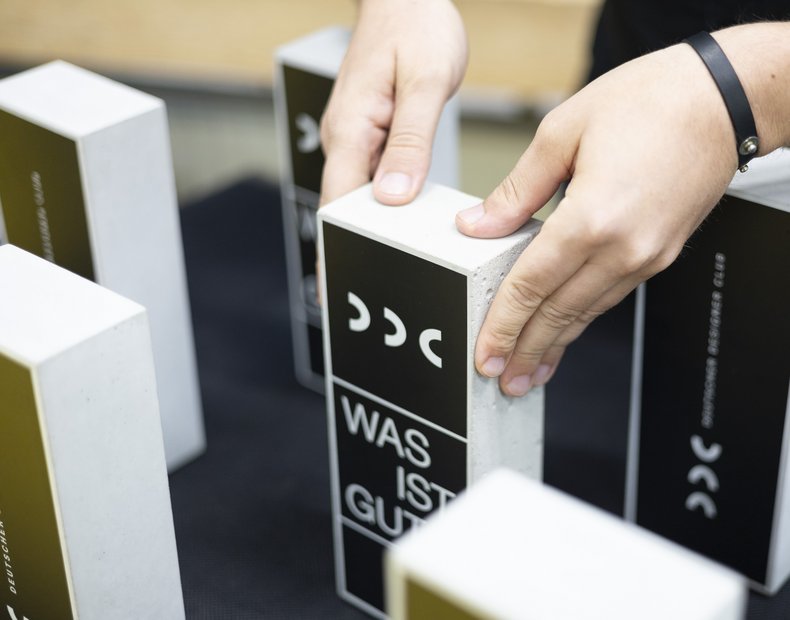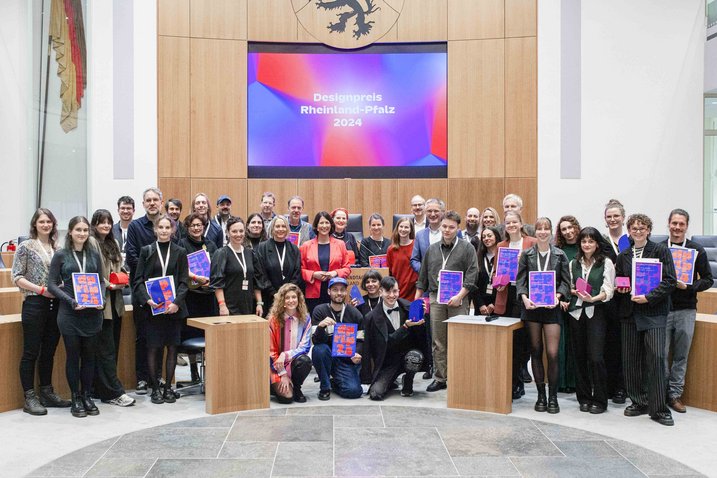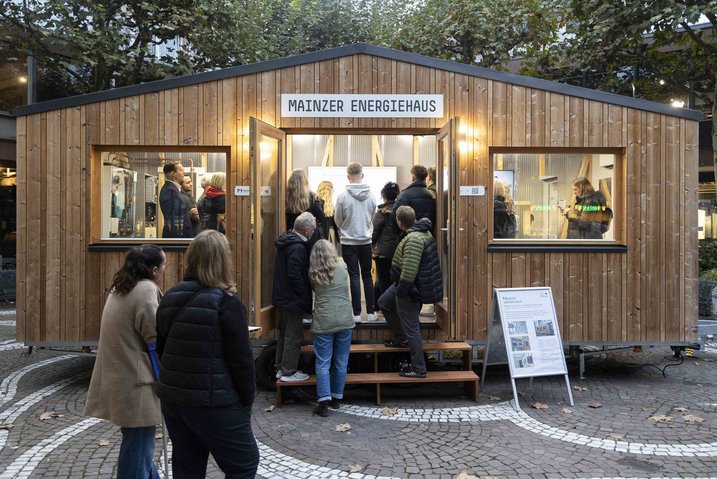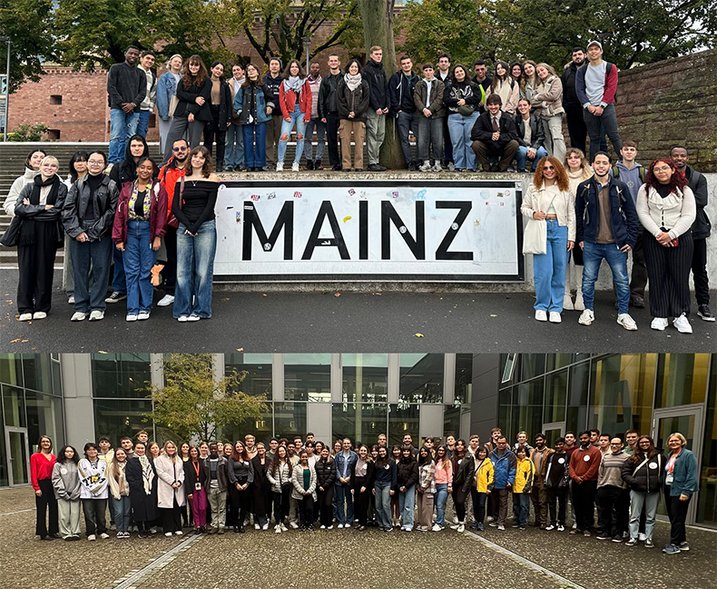Success right down the line: Four projects from Mainz University of Applied Sciences honored by the Deutsche Designer Club
On September 22, 2023, the Deutsche Designer Club (DCC) honored ideas and projects that make the world a better place in its Was ist gut 2023 design competition. Mainz University of Applied Sciences was a complete success. Four design projects received an award: A TOUCH OF TYPE – von der Geheimschrift zum Code, Dialog im Treibhaus, KOE.11-13 - Nutzungsänderung eines Kaufhauses and lokalkost. The latter is a project by the alma agency, which is backed by an alumna of Mainz University of Applied Sciences. A total of 180 projects were submitted.
The judges were looking for design projects in the three categories of Communication, Product and Space that create value-appreciating content, value-creating objects, and value-based living environments. The four projects received awards in the Communication and Space categories–two as implemented projects and two as conceptual projects.

Four awards for projects by current and former students of the School of Design
A TOUCH OF TYPE – von der Geheimschrift zum Code is a research and collaboration project of the Institut Designlabor Gutenberg, Mainz University of Applied Sciences and the Dialogmuseum Frankfurt. The exhibition and publication project communicates the topic of inclusive communication for a diverse society and raises awareness and curiosity about it. How do we design inclusive communication for a diverse society? How can knowledge about the writing systems of inclusion be communicated in a fun, sensory, and informative way? How do we raise awareness and curiosity about the topic? These are the questions behind the design of the Interactive Experience Space A TOUCH OF TYPE.
Award winner in the category: Communication – Implemented Projects
Design: Prof. Dr. Isabel Naegele, Klara Kletzka, Stephanie Kaplan (alumna), Saehyeen Shin (alumna) and meso digital interiors (Markus Wolf, Constantin Urban)
For more information, click here: https://ddc.de/de/wettbewerb/was-ist-gut-2023/auszeichnungen/kommunikation/KOR-0137-a-touch-of-type.php
Dialog im Treibhaus is a set of cards designed by Leonie Krein that encourages respectful and constructive conversations about the climate crisis in workshops or on an individual basis. Drawing on communication psychology, the set uses 30 cards to share knowledge about climate communication in a playful way, divided into three categories. In the first category, Psychological Foundations, general advice is given on how to better communicate climate change, based on (communication) psychology findings. The second category explains in more detail how framing can help in a person's own communication. The third category demonstrates concrete argumentation patterns that are used against climate protection and offers approaches on how to react to them. In addition to the analog cards, a QR code can be used to access digital cards that contain more information or solutions to exercises.
Award winner in the category: Communication – Concepts
Leonie Krein (alumna of Mainz University of Applied Sciences), Elisa Biscotti (photography), Prof. David Voss (bachelor's thesis advisor)
For more information, click here: https://ddc.de/de/wettbewerb/was-ist-gut-2023/auszeichnungen/kommunikation/KOK-0049-dialog-im-treibhaus.php
KOE.11-13 – Nutzungsänderung eines Kaufhauses: For her master's thesis, Henrieke Kayser designed the restructuring of a department store with a community-oriented use concept for the upper floor, while the first floor remains in commercial use. The space offers various options for sharing, collaborating, and communicating: Shelving space for the exchange of used items, a public workshop, and a library of things. In addition, studio, exhibition, and event spaces are located in the former retail space. KOE.11-13 is a groundbreaking concept for the future of downtown areas in cities by proposing the repurposing of a former department store as an answer to the desolation of these areas. For her master's thesis KOE.11-13. What does the future of inner-city areas look like and how do we want to use them in the future? Henrieke Kayser, a 2022 graduate of the Spatial Communication degree program, has already received the University Council Award of Mainz University of Applied Sciences. (Link: https://www.hs-mainz.de/en/news-1/preis-des-hochschulrats-3/)
Award winner in the category: Space – Concepts
Henrieke Kayser (alumna of Mainz University of Applied Sciences)
Advisors: Prof. Gerhard Kalhöfer and Prof. Bernd Benninghoff
For more information, click here: https://ddc.de/de/wettbewerb/was-ist-gut-2023/auszeichnungen/raum/RAK-0025-koe.11-13.php
lokalkost – with this branding project, the alma agency of Alice Schaffner, alumna of Mainz University of Applied Sciences, and Marie-Niamh Dowling developed a new name for the team Frischepost Rhein-Main. Lokalkost intends to hold its own against big corporations with its new name and a strategy geared toward protecting the planet for future generations, and to prove that regionality and seasonality do not mean having to do without. For a responsible use of resources and out of love for the region, the alma agency wants to play an active role in shaping this change.
Award winner in the category: Communication – Implemented Projects
alma agency, Alice Schaffner (alumna of Mainz University of Applied Sciences), Marie-Niamh Dowling
For more information, click here: https://ddc.de/de/wettbewerb/was-ist-gut-2023/auszeichnungen/kommunikation/KOR-0051-lokalkost.php
Finalists themselves determined award winners
A total of 180 projects were submitted to the DDC. 40 of them were selected after a pre-selection by DDC members under the guidance of the chairs of the panel of judges. Subsequently, the 40 finalists selected the winners themselves in a democratic and discursive process under the guidance of facilitators. Christine Moosmann from Grafikmagazin and Jan Stassen from the Museum für Werte in Berlin were available as expert judges in addition to the panel chairs to provide guidance and advice during the pre-selection process..
The judging workshops were followed by the evening event – with presentations by Kirsten Dietz and Dutch designer Ruben Pater, as well as a panel discussion on the question of how to generate and shape value(s) through design.

For more information on the Deutsche Designer Club and the DDC competition, click here: www.ddc.de




